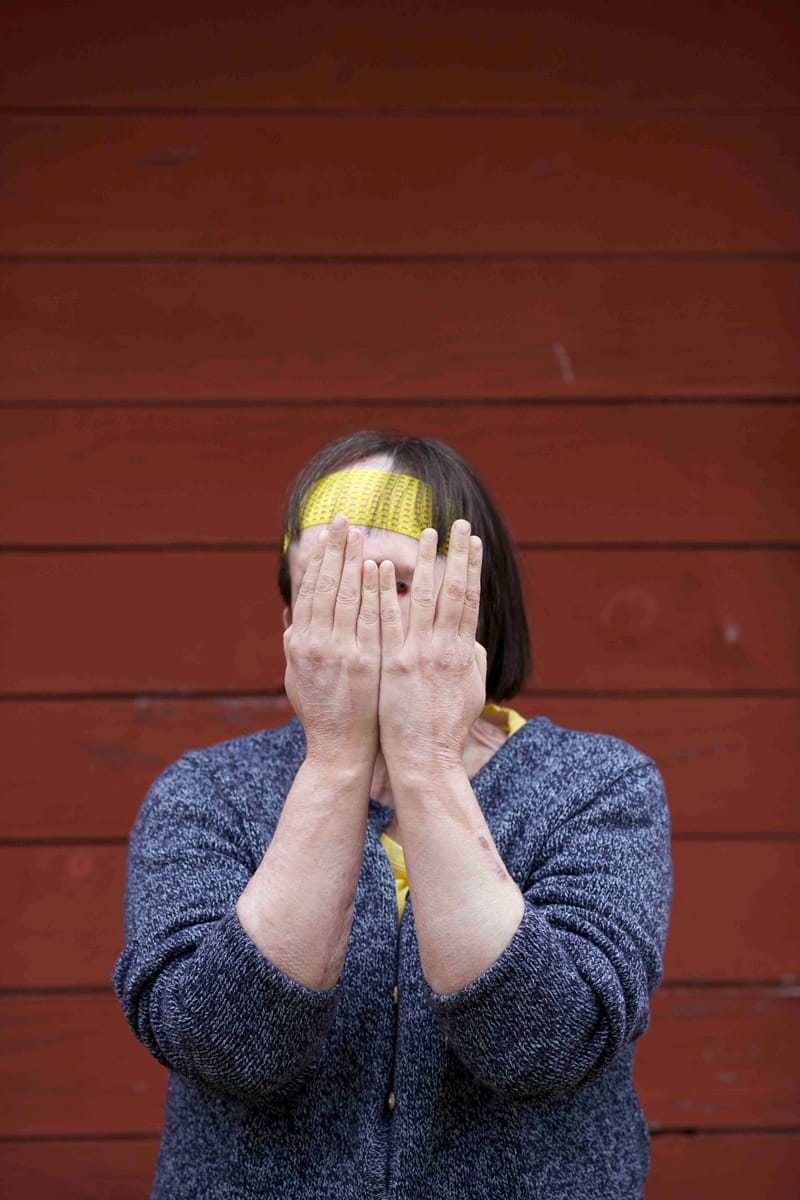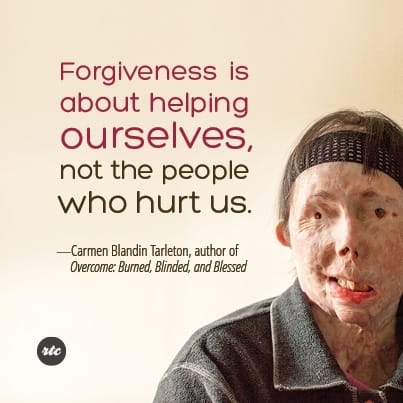
The Story of a Face
An Interview with Katie Gutierrez, the Editor of Carmen Tarleton’s First Book, Overcome: Burned, Blinded, and Blessed
A face is more than just an appearance. Facial expressions shape our emotions; they show our loved ones when we are happy or sad, angry or confused. Faces can be the first thing we seek in the morning and the last thing we kiss at night. In many ways, faces have the power to define our identities.
Yet, for Carmen Tarleton, her identity is rooted in more than just her face; her identity runs deep into the soul—there, she has found true self-acceptance, love, forgiveness, and incredible strength.
In 2007, Carmen Tarleton was the victim of a violent and traumatic attack committed by her ex-husband, now deceased. In the dead of night, her ex-husband had broken into her home and brutalized her with a baseball bat, before soaking her down with industrial-strength lye. This attack nearly blinded her and left her with burns all over her body. Since that moment in her life, Carmen Tarleton has undergone countless surgeries, including two face transplant surgeries, a rare procedure that has transformed her daily life.
In July 2020, Carmen had her second face transplant surgery—the first woman in the US to do so—which means another go at the process of acceptance. A new face yet the same heart, same mind, same spirit.
Back in 2012, Carmen leaned on Round Table Companies to help her tell her story of forgiveness and triumph over the most painful moments of her life. This partnering resulted in her first book, Overcome: Burned, Blinded, and Blessed, which explores both the traumatic event in Carmen’s life and its aftermath, including Carmen’s journey of finding forgiveness, overcoming pain, and choosing to live a happy life.

Carmen’s book editor, Katie Gutierrez, now the international best-selling author of More Than You'll Ever Know, sat down with Round Table Companies (her home for 8 years!) to share with us the intimate process of getting to know Carmen and getting to know her story.
RTC: When you think of Carmen, what’s the first word that pops into your mind?
KG: Strength. Not only did she survive one of the most violent and traumatic attacks I’ve ever heard of, but she’s endured years of painful surgeries, many—like her first face transplant—with crushing setbacks and debilitating periods of recovery. She’s lived through more physical pain than I can imagine, and rather than hate the man who put her in this position, she found the strength to forgive him and to share her story in the hopes that it will help others. Carmen’s well of internal strength seems to know no limits. She is one of the most extraordinary people I’ve ever had the honor of knowing.
RTC: What specific moments of Carmen’s story jump out at you that exemplify strength?
KG: When Carmen was in her medically induced coma after the attack, she had a dream or experience in which she explicitly chose to live. I think that choice set the path for so many of the years ahead—choosing not just to survive but to live. Not to give up hopes or dreams but to actually find new ones. My interpretation of her story is that she continues to make this choice every day.
RTC: Can you describe the process of RTC’s full manuscript development and working with Carmen on her book? What was it like to get to know her and her story?
KG: It was one of the most moving experiences of my life. Not only is Carmen an incredible human being, but she was a dream client from the start. She trusted me, and I think that trust led to levels of deep openness and intimacy in our phone calls. The biggest difference in our process compared to others is that, because Carmen was legally blind at the time we worked together, we edited chapters together over the phone, starting with my reading them out loud to her. That let us both immerse ourselves in the storytelling, the rhythm of the language, and the detail we needed to get the story right. It was a true collaboration.
RTC: As an editor of her book, what was it like getting to relive these intimate moments alongside her in the book writing process?
KG: I’ll never forget the day we discussed her attack. We’d both known it was coming—we knew where we were in the story, chronologically—and I’d tried to emotionally prepare, as I’m sure she did. But those calls (I think we took at least two to get through it) were difficult for both of us. I remember muting myself at one point so that she wouldn’t hear me weeping; I didn’t want to make her responsible for my emotional response, but I also wanted her to know how deeply I felt her pain—it was a delicate balance to strike, and I’m not sure I did. All I could do was listen and bear witness to the story she was brave enough to relive.
RTC: Was there ever a time in working with Carmen where she felt shy or unable to look at the raw material of her life; or was she always ready and willing to dive in?
KG: She was always ready to dive in. Describing the night of her attack is the perfect example. It was the kind of trauma that most who survive such a thing can’t bear to discuss, especially with someone they don’t know in “real life.” It must have been incredibly difficult to take me through the events that night, moment by moment. There were times we had to pause—she was crying, I was crying. We had to give ourselves some breathing room sometimes. But I could also tell she’d mentally prepared for it, that she was ready to share it, which is hugely important in the process of writing any kind of memoir. You generally need some distance from the major events to reflect on not just what happened or why, but how those events have shaped you, what they continue to mean to your life years later. Carmen had that distance. She’d already done the spiritual heavy lifting by the time she came to us. If she hadn’t been psychologically ready to tell this story, the process—and outcome—would have been very different.
RTC: When a client works with RTC, they become part of the family! What was the relationship like working with Carmen?
KG: I remember meeting Carmen in person—finally—at Brigham and Women’s Hospital in Boston shortly after her face transplant. I remember we just held each other. That hug was the perfect culmination of our work together—pure connection.

RTC: What do writers and editors do at RTC that makes the book writing experience different from others?
KG: I think the collaborative approach at RTC is a real point of difference from other writing companies. Most of the time, clients work not just with one writer but with a team of two or three, and behind the scenes, that team complements and strengthens each other in a way that benefits the client. Calls are planned in advance, and chapter drafts receive multiple passes before reaching a client. If there are challenges in the process, the team works together to diagnose and overcome them. There’s a sense of accountability and support between team members, and that means the client is also held accountable and supported. It creates an environment where creativity can flourish.
RTC: Why do you think RTC was such a good match for Carmen and her story?
KG: Carmen’s story required a special level of care—by which I mean people who truly cared for her and for her story. And we, as a company, all fell in love with Carmen. I think from the start, we all felt extraordinarily grateful to be working with her, and we felt ferociously protective of her and her story. We believed in her and her book with our whole hearts, which made us, I believe, the best advocates for her.
RTC: Why is it important for a client to open up and be vulnerable (with themselves, with the editors, with their audience) when working on their book?
KG: I mentioned earlier that it’s important to have some distance from the main events of a book in order to put them in a larger emotional context—why they mattered then, why they matter now. But it’s equally important to be able to access, and convey, their immediate emotion. Without vulnerability, a book becomes a factual description of events. It can be well written and smart, but it probably won’t truly move the reader. It won’t change them, won’t stir them into seeing the world—or themselves—in a different way.
RTC: What was the best part of working on this book with Carmen?
KG: I loved so many parts of working on this book. Just talking to Carmen as often as I did felt like a healing, almost spiritual experience. I always felt in the presence of someone with uncommon wisdom and grace, and I never stopped feeling incredibly lucky to be the one entrusted to write her story.
RTC: What’s the best thing about helping someone share their story?
KG: Ah, so many! I think in our current political climate—and of course now with the virus—it can be harder than ever to connect with people. To look at others with curiosity and kindness, rather than judgment and scorn, especially those we “know” to be different from us, whether because of race, ethnicity, class, religion, or political convictions. When you help someone share their story, the usual barriers to connection get broken down. You see them for the whole human that they are, shaped by their experiences just like you have been. You get invited into a different way of seeing the world, which is a particular gift in times like these. Helping someone tell their story reminds us of our fundamental human connections.

Want to read Carmen’s first book? You can find it here.
Want to know more about Carmen? Watch this video on our blog, where we spend some time with Carmen before her very first face transplant surgery.
[This interview has been edited and condensed.]